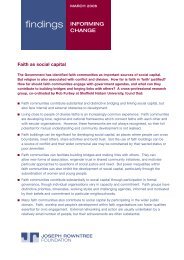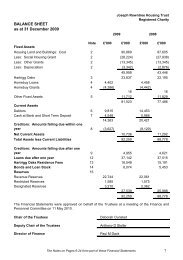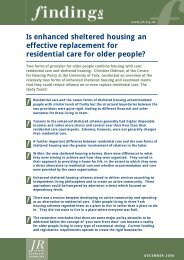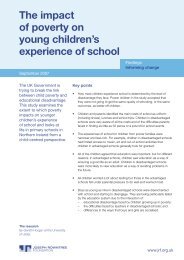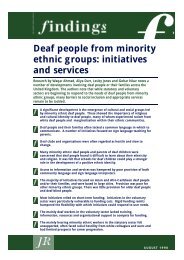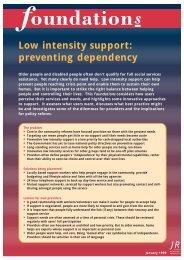Community participation - Joseph Rowntree Foundation
Community participation - Joseph Rowntree Foundation
Community participation - Joseph Rowntree Foundation
Create successful ePaper yourself
Turn your PDF publications into a flip-book with our unique Google optimized e-Paper software.
<strong>Community</strong> <strong>participation</strong><br />
Whether or not the wider community benefits from this depends on another aspect of<br />
these networks – the extent to which they overlap and combine with the more<br />
informal, bonding and bridging social capital that grows out of everyday involvement<br />
in local community groups, associations and activities. As we have seen, this<br />
interaction cannot be left to chance.<br />
If we want to strengthen the relationship between community <strong>participation</strong> in<br />
governance and social capital, simply encouraging more people to participate seems<br />
a forlorn hope, and creating more structures wrong-headed. The range of forces<br />
helping to perpetuate a community elite will make either approach ineffective.<br />
Establishing some premises<br />
This raises some fundamental questions for policy makers.The first question it raises<br />
is, ‘what are we really trying to do by devolving power to the very local level?’. To<br />
answer that question we need to leave aside the specific objectives of community<br />
<strong>participation</strong> policies, and actually think about how we understand the social and<br />
civic context of local community life. We need to acknowledge and make explicit the<br />
premises on which community <strong>participation</strong> policies are based. We propose three.<br />
1 More direct <strong>participation</strong> by citizens in decision making is the only credible basis<br />
on which democratic renewal will take place. But all citizens do not need to be<br />
equally involved for this <strong>participation</strong> to be legitimate.<br />
2 Elites of various kinds have always been vitally important in creating social<br />
change.<br />
3 Elites are only undemocratic if they are disconnected from processes by which<br />
they can be influenced and held to account by the communities they purport to<br />
serve.<br />
Since the achievement of universal suffrage and free and fair elections in the UK and<br />
elsewhere in the late nineteenth and early twentieth century, democracy has become<br />
synonymous with mass electoral representation. Universal representative rights<br />
remain, to be sure, a necessary condition for democracy and an all-too fragile asset<br />
in many parts of the world. However, the lesson of recent history is that they are not<br />
a sufficient condition. The decline of more active forms of <strong>participation</strong> in many<br />
different settings – political parties or pressure groups, trade unions or community<br />
organisations, parks committees or faith-based organisations – has weakened<br />
48



